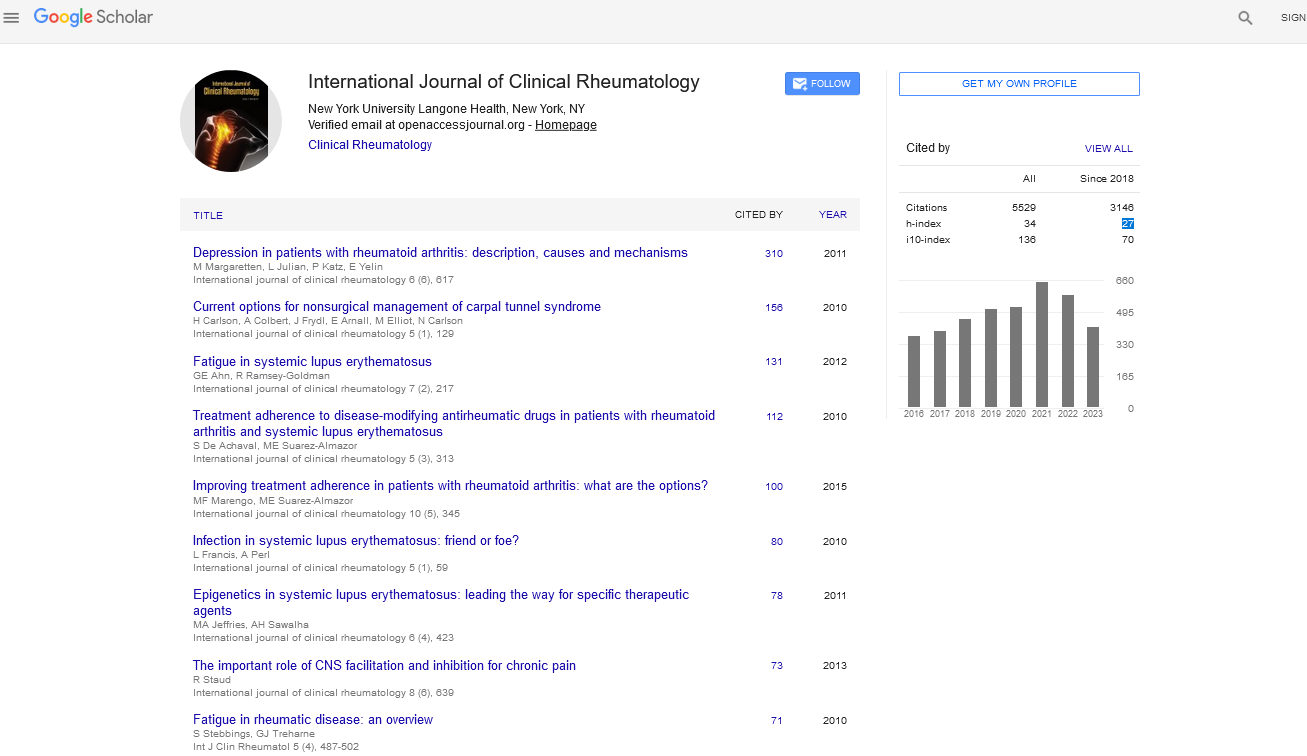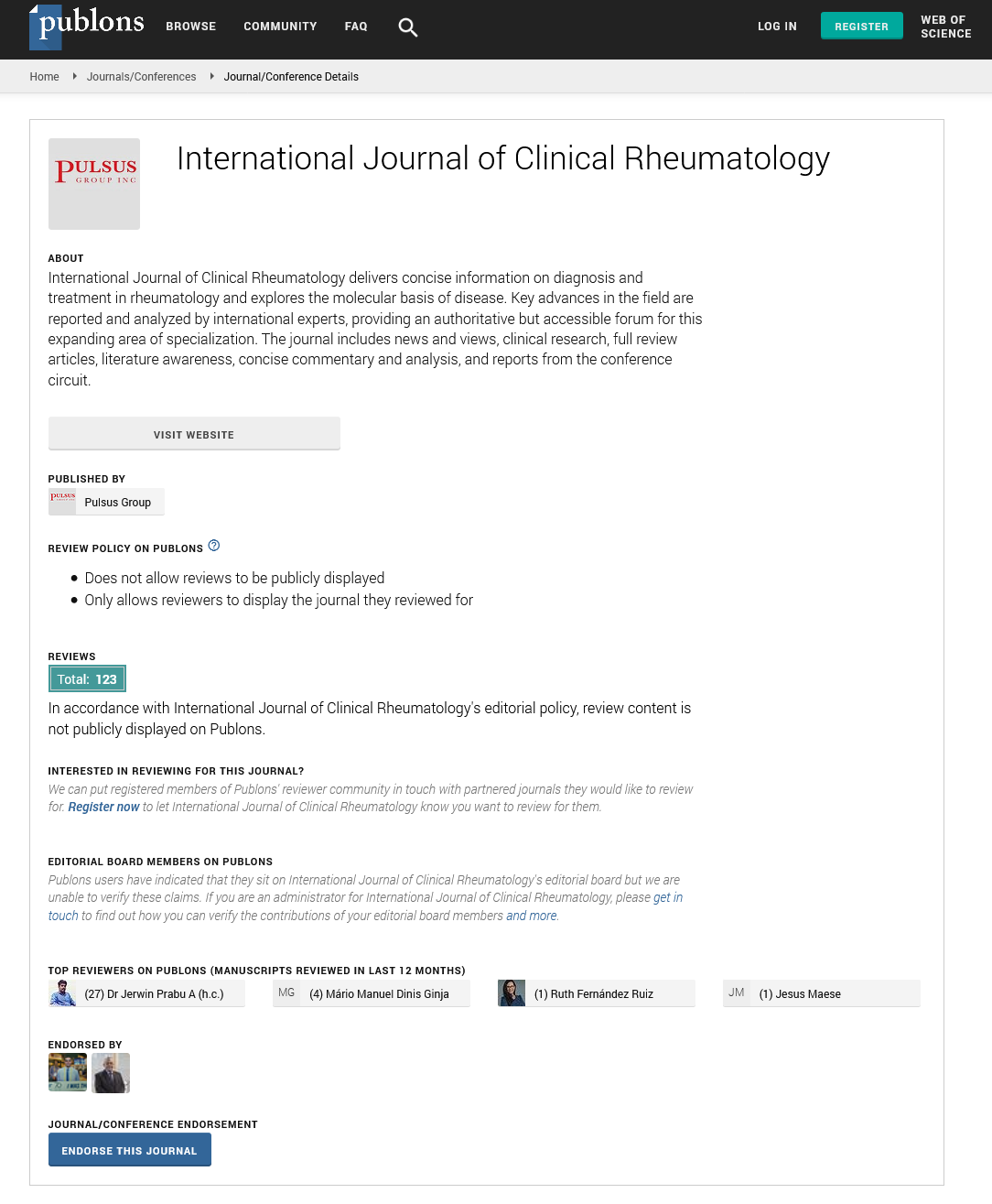Perspective - International Journal of Clinical Rheumatology (2024) Volume 19, Issue 11
The Role of Inflammation in Cardiovascular Risk in Rheumatoid Arthritis: A Meta-Analysis of Long-Term Outcomes
Sophia Green*
Division of Rheumatology, University of São Paulo, São Paulo, Brazil
- *Corresponding Author:
- Sophia Green
Division of Rheumatology, University of São Paulo, São Paulo, Brazil
E-mail: sophia.green56@yahoo.com
Received: 02-Nov-2024, Manuscript No. fmijcr-25-157436; Editor assigned: 04- Nov-2024, Pre-QC No. fmijcr-25-157436 (PQ); Reviewed: 18-Nov-2024, QC No. fmijcr-25-157436; Revised: 23-Nov- 2024, Manuscript No. fmijcr-25-157436 (R); Published: 30-Nov-2024, DOI: 10.37532/1758-4272.2024.19(11).332-335
Abstract
Patients with rheumatoid arthritis (RA) are at an increased risk of cardiovascular disease (CVD), and chronic inflammation is thought to play a key role in this association. This meta-analysis consolidates data from long-term cohort studies to assess the impact of inflammatory markers on cardiovascular outcomes in RA. The results indicate that elevated levels of C-reactive protein (CRP) and erythrocyte sedimentation rate (ESR) are significantly associated with an increased risk of CVD in RA patients, independent of traditional cardiovascular risk factors. These findings highlight the importance of managing inflammation in reducing cardiovascular morbidity and mortality in RA.
Keywords
Rheumatoid arthritis● cardiovascular disease● inflammation● C-reactive protein● erythrocyte sedimentation rate● long-term outcomes● risk factors
Introduction
Rheumatoid arthritis (RA) is a chronic autoimmune disease characterized by systemic inflammation, primarily affecting the joints but also influencing a wide range of organ systems. In addition to the debilitating effects on the musculoskeletal system, RA is associated with an increased risk of cardiovascular diseases (CVD), including atherosclerosis, coronary artery disease, myocardial infarction, and stroke. This elevated cardiovascular risk is a well-established phenomenon, with patients with RA experiencing a significantly higher rate of cardiovascular events compared to the general population [1]. The pathophysiology of this heightened cardiovascular risk in RA is multifactorial, with inflammation being a central contributor. Systemic inflammation, driven by pro-inflammatory cytokines such as tumor necrosis factor (TNF), interleukin-6 (IL-6), and C-reactive protein (CRP), plays a pivotal role in the development of atherosclerosis and endothelial dysfunction. Over time, chronic inflammation in RA leads to accelerated atherosclerosis, which in turn increases the likelihood of cardiovascular events. Despite extensive research on the relationship between inflammation and cardiovascular risk in RA, there remains a need for more precise understanding of the long-term outcomes of inflammation on cardiovascular health in this patient population. This meta-analysis aims to synthesize available data on the role of systemic inflammation in cardiovascular risk in RA, focusing on long-term outcomes. By analyzing studies that assess the relationship between inflammatory markers and cardiovascular events, this study seeks to provide a clearer picture of how inflammation influences cardiovascular outcomes in RA patients and the potential implications for clinical management [2].
Discussion
Inflammation as a Risk Factor for Cardiovascular Disease in Rheumatoid Arthritis
Rheumatoid arthritis is an inherently inflammatory condition, with inflammation affecting not only the joints but also the vascular system. In RA, there is an overproduction of inflammatory cytokines such as TNF, IL-1, and IL-6, which have been shown to play a direct role in the development of cardiovascular disease. These cytokines contribute to endothelial dysfunction, a key early step in the development of atherosclerosis. Endothelial cells, which line blood vessels, become damaged by prolonged exposure to these inflammatory cytokines, leading to an increased propensity for plaque formation in arteries. Furthermore, the persistent elevation of CRP, a well-known marker of inflammation, has been associated with an increased risk of cardiovascular events in RA. CRP is not only a marker but also a mediator of inflammation, promoting the formation of atherosclerotic plaques and contributing to their instability. Elevated CRP levels are often seen in patients with active RA and correlate with increased cardiovascular morbidity and mortality. As such, it is hypothesized that the inflammatory burden in RA accelerates the atherosclerotic process, making patients more vulnerable to cardiovascular events such as myocardial infarction and stroke. In addition to the direct effects of cytokines and CRP, chronic inflammation in RA also leads to metabolic disturbances that increase cardiovascular risk. For example, inflammatory processes in RA can lead to insulin resistance, dyslipidemia, and changes in blood pressure regulation, all of which are well-established risk factors for cardiovascular disease. These comorbidities, coupled with the direct inflammatory effects, contribute to the heightened cardiovascular risk seen in RA patients [3].
Long-Term Cardiovascular Outcomes in Rheumatoid Arthritis
Long-term studies examining cardiovascular outcomes in RA have consistently shown that patients with RA experience an increased incidence of cardiovascular events over time. While the exact magnitude of this risk can vary depending on the population studied and the presence of traditional cardiovascular risk factors, the increased risk is substantial. Several longitudinal studies have demonstrated that the cardiovascular mortality rate in RA patients is two to three times higher than in the general population. The duration and intensity of inflammation in RA appear to be crucial determinants of cardiovascular risk. Patients with longstanding, poorly controlled RA are at particularly high risk of developing cardiovascular disease, as chronic inflammation exacerbates atherosclerosis and accelerates plaque rupture [4]. Conversely, studies have shown that the control of inflammation, particularly through the use of disease-modifying antirheumatic drugs (DMARDs) such as methotrexate, biologic agents (TNF inhibitors, IL-6 inhibitors), or Janus kinase inhibitors, can help mitigate the cardiovascular risk by reducing systemic inflammation. This suggests that inflammation is not only a risk factor but also a modifiable contributor to cardiovascular outcomes in RA patients. Meta-analyses of cardiovascular risk in RA have further reinforced the idea that sustained inflammation is a critical driver of adverse cardiovascular outcomes. Patients with RA who have high levels of inflammatory markers, such as elevated CRP or erythrocyte sedimentation rate (ESR), are more likely to experience myocardial infarction, stroke, and other cardiovascular complications. These findings underscore the importance of monitoring and managing inflammation in RA patients as part of an integrated strategy to reduce cardiovascular risk [5].
Impact of Disease Modifying Therapies on Cardiovascular Risk
The impact of disease-modifying therapies on cardiovascular risk in RA has been a topic of great interest in recent years. The introduction of biologic therapies, including TNF inhibitors, IL-6 inhibitors, and B-cell depletion therapies, has revolutionized the management of RA, leading to better control of inflammation and improved long-term outcomes. Several studies have suggested that the use of biologic therapies not only improves joint symptoms but may also have a beneficial effect on cardiovascular health by reducing systemic inflammation. For example, TNF inhibitors, which are widely used in the treatment of RA, have been shown to lower CRP levels and improve endothelial function. This has led to a reduction in the progression of atherosclerosis and a decrease in cardiovascular events. Similarly, IL-6 inhibitors, which target the IL-6 pathway, have shown promising results in both reducing inflammation and improving cardiovascular outcomes in RA patients. The use of methotrexate, one of the oldest and most commonly used DMARDs, has also been associated with a reduction in cardiovascular events in RA. Methotrexate’s anti-inflammatory effects help reduce the production of pro-inflammatory cytokines and decrease CRP levels, thereby reducing the overall cardiovascular risk. The benefits of methotrexate may extend beyond joint protection, contributing to the overall reduction in cardiovascular morbidity and mortality in RA patients. However, it is important to note that while biologic therapies have shown promise in reducing cardiovascular risk, they are not without their risks. Some biologics, particularly TNF inhibitors, have been associated with an increased risk of infections and other adverse effects, which may complicate the overall management of RA patients. Thus, balancing the benefits of inflammation control with the risks of treatment is essential in clinical decision-making [6].
Limitations and Areas for Future Research
While the findings from this meta-analysis and previous studies highlight the strong link between inflammation and cardiovascular risk in RA, several limitations must be considered. Many studies have relied on surrogate markers of cardiovascular disease, such as CRP levels or carotid intima-media thickness, rather than directly measuring clinical cardiovascular outcomes like myocardial infarction or stroke. Additionally, there is a need for more randomized controlled trials (RCTs) to better understand the causal relationship between inflammation and cardiovascular events in RA. Future research should focus on further elucidating the underlying mechanisms by which inflammation contributes to cardiovascular disease in RA. Investigating the role of specific cytokines, immune cells, and metabolic changes in the development of atherosclerosis could lead to new therapeutic targets for reducing cardiovascular risk in RA patients. Moreover, studies investigating the long-term effects of biologic therapies on cardiovascular health will help refine treatment strategies and improve patient outcomes.
Conclusion
Rheumatoid arthritis is a chronic inflammatory disease that significantly increases the risk of cardiovascular events, and this increased risk is largely attributed to the persistent systemic inflammation that characterizes RA. Chronic inflammation, driven by pro-inflammatory cytokines and markers like CRP, leads to endothelial dysfunction, accelerated atherosclerosis, and increased cardiovascular morbidity and mortality. Long-term studies have consistently shown that RA patients experience a substantially higher risk of cardiovascular events compared to the general population, and controlling inflammation appears to be a key strategy in mitigating this risk.
Disease-modifying therapies, particularly biologics and methotrexate, have shown promise in reducing both inflammation and cardiovascular risk, highlighting the importance of inflammation management in RA care. However, further research is needed to fully understand the mechanisms linking inflammation to cardiovascular disease in RA and to optimize treatment strategies for reducing cardiovascular morbidity in these patients. Addressing cardiovascular risk in RA should be an integral part of clinical management, focusing on both controlling inflammation and managing traditional cardiovascular risk factors to improve overall patient outcomes.
References
- Torres AG (2004) Current aspects of Shigella pathogenesis. Rev Latinoam Microbiol 46: 89-97.
- Varghese S, Aggarwal A (2011) Extended spectrum beta-lactamase production in Shigella isolates-A matter of concern. Indian J Med Microbiol 29: 76.
- Peirano G, Agersø Y, Aarestrup FM, Dos Prazeres Rodrigues D (2005) Occurrence of integrons and resistance genes among sulphonamide-resistant Shigella spp. from Brazil. J Antimicrob Chemother 55: 301–305.
- Kang HY, Jeong YS, Oh JY, Tae SH, Choi CH, et al. (2005) Characterization of antimicrobial resistance and class 1 integrons found in Escherichia coli isolates from humans and animals in Korea. J Antimicrob Chemother 55: 639-644.
- Pan J-C, Ye R, Meng D-M, Zhang W, Wang H-Q, et al. (2006) Molecular characteristics of class 1 and class 2 integrons and their relationships to antibiotic resistance in clinical isolates of Shigella sonnei and Shigella flexneri. J Antimicrob Chemother 58: 288–296.
- The HC, Thanh DP, Holt KE, Thomson NR, Baker S (2016) The genomic signatures of Shigella evolution, adaptation and geographical spread. Nat Rev Microbiol 14: 235.
Indexed at, Google Scholar, Crossref
Indexed at, Google Scholar, Crossref
Indexed at, Google Scholar, Crossref
Indexed at, Google Scholar, Crossref


